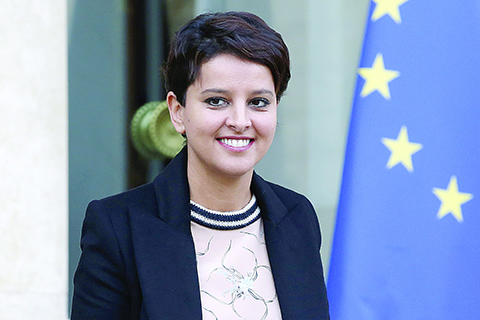PARIS: She is a rising political star and a striking immigrant success story from France's ghetto-like suburbs, but Education Minister Najat Vallaud-Belkacem faces huge obstacles in fighting the inequality she herself overcame. "The system in France is like we're all running the 100 metres, but some have a 30-metre head start and some start 30 metres behind," she tells AFP. The word "egalite" might be plastered over every school, but OECD studies show inequality is rising faster in France's classrooms than in any other developed country.
Unlike much of France's closeted political elite, Vallaud-Belkacem has experienced that challenge first-hand, having grown up as a relatively poor Moroccan immigrant in the northern town of Amiens. The 38-year-old worked her way up through local government into Socialist presidential campaign teams in 2007 and 2012, before being named women's minister and becoming a hate figure for the right with her efforts to improve gender equality in schools. Last year she became the first-ever female education minister, and many say her star has much further to climb.
The back-story gives her concerns about inequality a ring of sincerity. "When I look back at where I came from, at the school I attended... my classmates for the most part haven't had successful paths - many have had a difficult, chaotic path," she says. This is not especially new, she warns, but it is getting worse. "We can't idealise some bygone time when school was necessarily a social ladder for people from modest backgrounds," she says.
"(But) what worries me... there's always been inequalities, social determinism, but perhaps not this level of disenchantment that I feel when I go back to Amiens today, when I see families in the same socio-economic conditions I was in. People can't even imagine that it's possible to succeed anymore." The irony, say experts and teachers, is that France's very insistence on equality could be the root cause of the problem.
'A Big Shock'
"It was a beautiful idea in the beginning: everyone gets the same education," says a head teacher in Saint Denis just north of Paris, who spoke on condition of anonymity. "But unfortunately, not all pupils are the same." His school lies in a rough, working-class neighbourhood of mostly first- and second-generation migrants, plagued by gang rivalries and high unemployment.
But any hopes of tailoring the teaching to the specific challenges of the community run up against a system which strictly enforces a uniform curriculum. "Few of the teachers come from this area," says the principal. "It can be a big shock, a real panic for them. They don't know how to speak to these pupils, they may never have met populations like this."
Young teachers have little control over where they are posted and the least experienced often end up in the worst schools. "They feel they're drowning in the problems these kids face: social problems, language problems, family problems. They aren't trained for that." The traditional view of the teacher dictating to rows of attentive pupils still dominates training despite its increasing distance from reality, leaving little room for more flexible teaching styles.
Without strong parental support, many children fall through the gaps. "The success of students is completely tied to what parents do and who they are," says the head teacher. "That's profoundly unchanged in France, and that's terrible."
'The Rich Have Left'
Vallaud-Belkacem knows the problems, and promises that reforms are underway: more teachers and money for schools in tough areas, a more flexible curriculum and better training. Most controversially, she announced a pilot scheme last week by which parents in a few areas will have a choice of schools for the first time, and local councils tasked with ensuring a mix of social groups in each one. "I'm not preparing a revolution," vowed the minister, but she knows any changes to school districts will be explosive.
As many governments round the world have found, such plans run aground as soon as wealthier parents are told to send their children to rougher schools. "She's going to fail," says Rodrigo Munoz, president of a parent-teacher association in Saint-Denis. "The rich have left and they aren't coming back."
Meanwhile, standards are collapsing. The OECD's PISA scores, which compare schools around the world, showed a six-percent drop in history, geography and maths scores for France between 2000 and 2012. Vallaud-Belkacem says it will take time to turn around the scores, and France cannot just wait for the next OECD results "with fear in our stomachs". "We have to grab the bull by the horns," she says. - AFP











